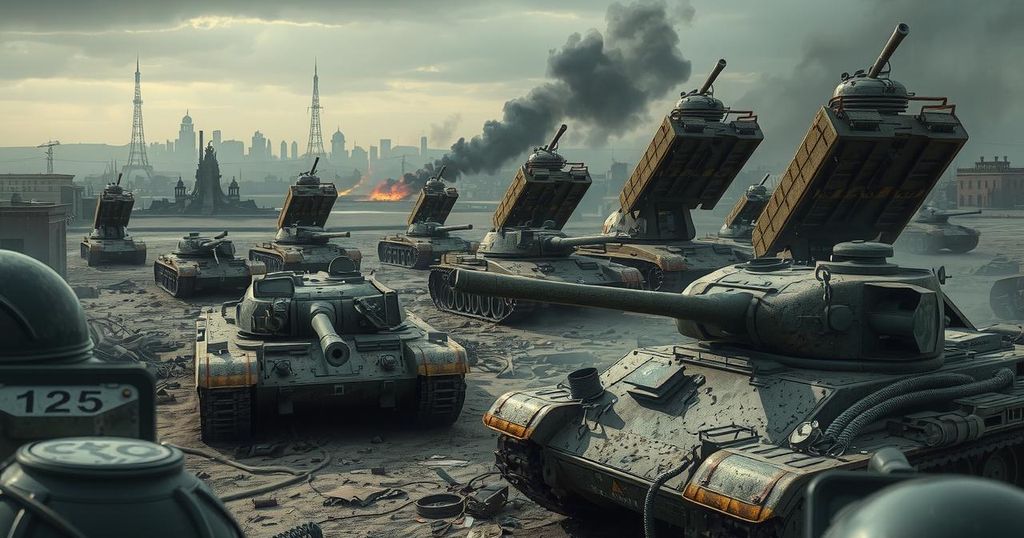Former Sudanese Prime Minister Doubts Military Gains Will End Civil War
Sudan’s former prime minister Abdalla Hamdok dismissed military advances in Khartoum as insubstantial and criticized the formation of a new government as “fake.” He highlighted that the civil war, responsible for massive loss of life and displacement, can only end through addressing deep-rooted inequalities and establishing democratic governance. Hamdok rejected claims of imminent peace, emphasizing the need to confront the reality of ongoing violence and foreign arms involvement.
In an interview held on the sidelines of the Mo Ibrahim Foundation’s governance conference in Marrakech, Morocco, Sudan’s former prime minister, Abdalla Hamdok, expressed skepticism regarding the military’s recent advances in the ongoing conflict. He termed the military’s attempts to establish a new government as “fake” and asserted that recent successes, including the recapturing of Khartoum, would not bring an end to the civil war that has plagued Sudan for two years.
Hamdok, who became the country’s first civilian prime minister following decades of military dominance, mentioned that the war has tragically resulted in tens of thousands of deaths and displaced millions. “Whether Khartoum is captured or not captured, it’s irrelevant,” he stated, stressing that a military solution is unattainable, and that neither side could claim an outright victory in this conflict.
His resignation in January 2022 followed a tumultuous period marked by a coup and a brief reinstatement. Following his departure, the civil strife escalated markedly, with fighting between the Sudanese army and the paramilitary Rapid Support Forces (RSF) resulting in at least 24,000 fatalities, although experts believe the actual number could be significantly higher. Both factions are under investigation for war crimes.
The RSF is associated with the notorious Janjaweed militia from Darfur and has been implicated in genocide. Conversely, the Sudanese army faces accusations of using chemical weapons and deliberately targeting civilians. This ongoing conflict has displaced approximately 13 million people, creating a dire humanitarian crisis, including widespread famine and a cholera outbreak.
Despite recent military gains, including the recapturing of key territories around Khartoum in March, Gen. Abdel-Fattah Burhan, the army chief, has touted these developments as pivotal moments. Last month, he appointed a new prime minister for the first time since the onset of war, aiming to establish a new government. Yet, fighting remains active, with the RSF continuing to regroup in Darfur and make advances elsewhere.
Hamdok, now a leader of a civilian coalition from exile, dismissed the notion that the conflict is easing, labeling it “total nonsense.” He criticized the idea of initiating reconstruction in Khartoum while conflict rages in other regions as “absolutely ridiculous.” He emphasized that any governance effort at this juncture is insubstantial, given that sustainable peace can only emerge by addressing the underlying issues fueling the war.
A credible ceasefire paired with a genuine move toward democracy and civilian rule, he argued, would require confronting Sudan’s deep-rooted inequalities. Moreover, he asserted that relying on the military to democratize the country is a false hope.
Hamdok noted that the war’s fuel is exacerbated by foreign powers accused of supplying arms to both sides. His coalition has condemned crimes committed by both factions, though he refrained from criticizing the UAE for allegedly arming the RSF, even in light of a UN investigation. He warned against a narrative that only points fingers at certain nations, adding that arms supplies must cease from all parties involved. “What we would like to see is anybody who is supplying arms to any side to stop,” he concluded.
In conclusion, Abdalla Hamdok’s remarks underscore the complexity of the ongoing civil war in Sudan, which continues to claim lives and displace millions. He firmly believes that military victories will not lead to an end of the violence, warning that any government formed under current conditions is fundamentally flawed. True peace, he insists, requires addressing the root causes of the conflict and halting international arms supplies. Without genuine political will and a focus on the underlying social issues, the hope for a stable future remains distant.
Original Source: apnews.com




Post Comment